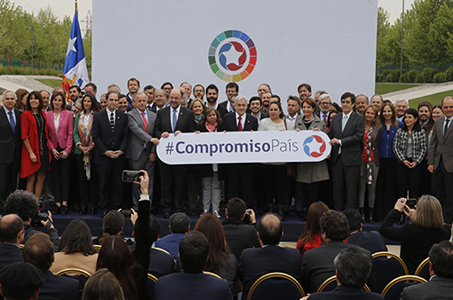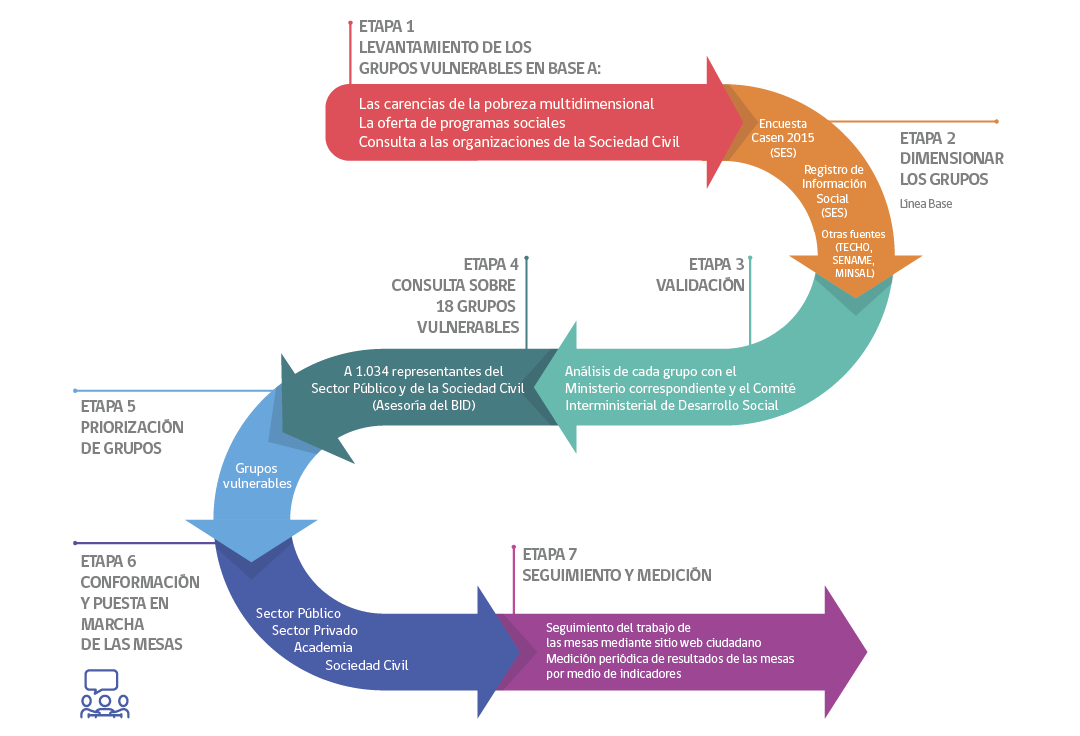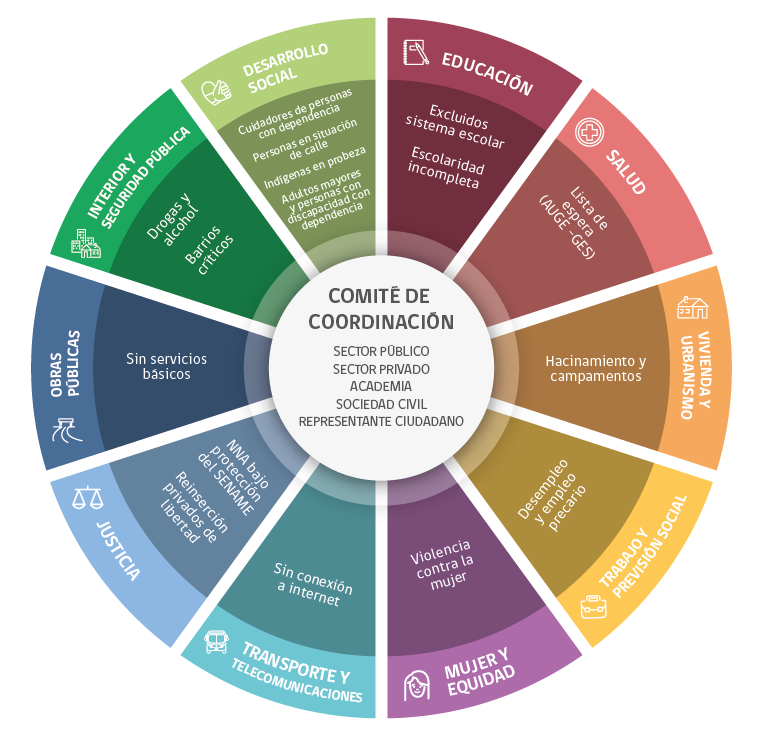Compromiso País - Para que ningún chileno se quede atrás (Country Commitment - to leave no one behind) - a multi-stakeholder program with the objective to design and implement solutions to complex problems that affect vulnerable groups.
Description
During the last decade, monetary poverty in Chile has been descending steadily, from 29.1% in 2006 to 8.6% in 2017. But a recent stagnation of Multidimensional Poverty Index (MPI) has been transformed in an important call for action. With the idea of “leaving no one behind”, Compromiso País is a multi-stakeholder program with the objective to design and implement solutions to complex problems that affect vulnerable groups. The initial focus is in 16 vulnerable groups, implementing working groups among the public and private sector, academia, civil society and the government, establishing a process in which the solutions are designed, implemented and evaluated collaboratively.
Compromiso País is a new way of addressing social problems through a common understanding of every sector of society, making them work together in order to solve the most pressing challenges of our society (so that in Chile no one is left behind). Besides the disruptive way of approaching these problems, these 16 groups take different social areas addressing different Social Development Goals, based on the Multidimensional Poverty Index, current social programs, interviews with civil society and a public consultation. <br />
Working Groups gathered to solve the challenges for the following Vulnerable groups (and its relationship to the SDGs):<br />
1. People living without drinking water or bathroom in their households. SDG: 1, 6, 10.<br />
2. Women suffering from intrafamily violence without personal income. SDG: 1, 5, 16.<br />
3. People living in crowded conditions or slums. SDG: 1, 11.<br />
4. Children living under the care of Child Welfare System. SDG: 1, 10, 16.<br />
5. People in situation of dependence (moderate and severe) living alone or institutionalized. nSDG: 1, 3, 10.<br />
6. Children not attending to school. SDG: 1, 4, 10. <br />
7. People with alcohol and drugs abuse. SDG: 1, 3, 10.<br />
8. People over 18 years old without 12 years of schooling completed. SDG: 1, 4, 10.<br />
9. People with a delay on access to State health care. SDG: 1, 3, 10. <br />
10. People who claim to have seen drug trafficking or shootings in the last month. SDG: 1, 11, 10.<br />
11. People unemployed for 3 months or more and people without a work contract. SDG: 1, 8.<br />
12. Families in which a member is functionally dependent (moderate and severe). SDG: 1, 3, 10.<br />
13. Homeless people. SDG: 1, 10.<br />
14. Indigenous people in the first two income quintiles. SDG: 1, 10, 16.<br />
15. Prisoners without re-entry programs. SDG: 1, 8, 10, 16.<br />
16. Locations without internet connection. SDG: 1, 9, 10.
Compromiso País was created with the intention that everyone in the society with interest in helping these vulnerable people talk and converge into a common approach. This approach is innovative because of the different stakeholders that are being invited to the working group. For ensure that we let the groups emerge with their own way of approaching the challenge for a little while. However, the tables were accompanied by an expert consultant form Virtus Partners, they had the mission of enable the dialogue, focusing on the form.
In order to ensure a proper working methodology, the Undersecretary of Social Evaluation proposed a process based on the theory of change and the ex – ante process that every social program in the State went through in the budgeting process. This methodology is focused on the idea of having diagnosis in place, evaluating several alternatives with established criteria, establishing indicators (outcomes and outputs) and estimating the costs of the intervention. This framework also includes a monitoring mechanism according to the diagnosis and intervention stages.
Also, with the methodology we established a common language across the working groups, with which every component of the process will be communicated for everyone to see the progress that each working group is making.
All of these processes are taken place from October 2018, when Compromiso País was launched. The methodology was proposed in December 2018 and the diagnosis phase is planned to be completed by March 2019. Despite this, the process has a “spiral form”, meaning that the diagnosis can be modified if the intervention analysis result in a new direction or stablish a new specification in the target group that redefines the diagnosis.
Other enabling conditions was the fact that the Social Development Minister, Alfredo Moreno, already had experience from the Private Sector in making representatives from different sectors of the society talk about important social issues. He organized a pilot for Compromiso País with the reentry into society for ex-convicts. The successful results from this Pilot were evidence in order to deicide to pursue this endeavor on a bigger scale.
Besides these elements, the government had been driving a strong agenda based on the common agreements between different sides of the society in main social issues like childhood, health, economy, and so on. This spirit has set the course and established that “Chile is being made by everyone” (“Chile lo hacemos todos”).
The initiative provides a “controlled environment” to test new ways of approaching social problems that the government by themselves can’t. The whole idea is to gather new evidence to implement new solutions on a bigger scale.
All of this can be implemented in other areas that indeed are of common interest. For example, in the environmental area, it could be organized a working group among the Ministry of Environment, the private sector (a mining enterprise), a representative of the civil society (an ONG) and an academic interested on climate change. They can follow the same process of the working groups: through dialogue they can establish a diagnosis, propose interventions, define indicators and make a positive impact in the problem under study.
With the idea of “leaving no one behind”, Compromiso País is a multi-stakeholder program with the objective to design and implement solutions to complex problems that affect vulnerable groups. The main focus of the program is on the problems and the novel methodology defined to develop solutions: the initial effort started with a focusi in 16 vulnerable groups, implementing 16 initial working groups among the public and private sector, academia, civil society and the government, establishing a process in which the solutions are designed, implemented and evaluated collaboratively. Compromiso País is a new way of addressing social problems through a common understanding of every sector of society, making them work together (so that in Chile no one is left behind). Besides the disruptive way of approaching these problems, these 16 groups take different social areas addressing different Social Development Goals, based on the Multidimensional Poverty Index, current social programs, interviews with civil society and a public consultation.
Main published articles and news stories: https://www.emol.com/noticias/Nacional/2018/10/17/924156/Compromiso-Pai…
https://www.latercera.com/politica/noticia/compromiso-pais-pinera-prese…
https://www.24horas.cl/politica/pinera-lanza-programa-compromiso-pais-q…
http://www.t13.cl/radio/politica/conexion-tele13/noticia/gobierno-expli…\
Official statements: https://prensa.presidencia.cl/discurso.aspx?id=84628
https://prensa.presidencia.cl/comunicado.aspx?id=84674
SDGS & Targets
Deliverables & Timeline
Resources mobilized
Partnership Progress
| Name | Description |
|---|---|
| 17.14 | Enhance policy coherence for sustainable development |
Feedback
Action Network


Timeline
Entity
Region
- Latin America and the Caribbean
Geographical coverage
Photos



Website/More information
Countries

Contact Information
Martin Garcia, Head of Division, Public - Private Partnerships, Social Evaluation Undersecrtariat
